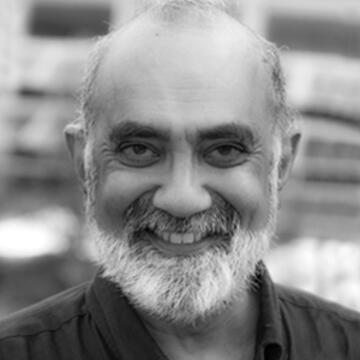
Ramesh Krishnamurti

Professor Ramesh Krishnamurti joined the School of Architecture faculty in 1989. He was tenured and became a full professor in 1994. In this role, his responsibilities included both undergraduate and graduate teaching and PhD advising. In 2000-01 and 2002-03 he served as the Chair of the SoA’s graduate program. Ramesh taught courses in shape grammars, spatial constructions, geometrical modeling, computer animation, configurational design, symmetry, geometry, computer modeling, computer programming, and user interface design.
Much of Ramesh’s work has a multidisciplinary flavor. He has worked on object-agents in design environments, knowledge-based design systems, the integration of natural language and graphics, spatial algorithms, robotic construction, computer simulation, computer graphics and graphical programming environments, user-interfaces for a variety of design applications, and computer-supported collaborative work. He worked with researchers from Civil Engineering and Robotics at CMU to look at the utilization of laser scanning and embedded sensor technologies within a dynamically changing construction environment, and with researchers from Delft University to look at generative design and model representations.
Ramesh’s principal area of research was in computational design with particular emphasis on the formal, semantic, and algorithmic aspects of generative construction and the development of design as computation via highly-coupled parallel explorations of form and description. He is perhaps best known for his work on the computational problems in shape grammar theory and for algorithms for spatial patterns.
He holds a degree in Electrical Engineering from the University of Madras, India and a degree with honors in Computer Science from the University of Canberra, Australia. Ramesh pursued postgraduate studies in Systems Design at the University of Waterloo, Canada earning a M.A.Sc in 1975 and Ph.D in 1980.
Ramesh’s research received support from major sponsors including the UK Science and Engineering Research Council, ESPRIT (European Strategic Programme on Information Technology), National Science Foundation (NSF), Defense Advanced Research Projects Agency (DARPA), US Army Corp of Engineers Civil Engineering Research laboratory, Japan Research Institute, and Autodesk.